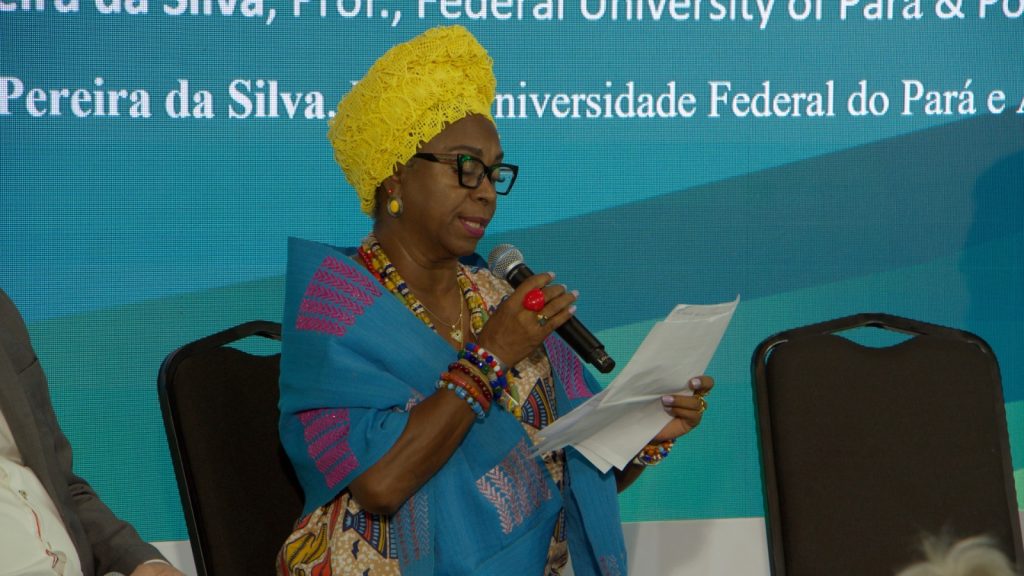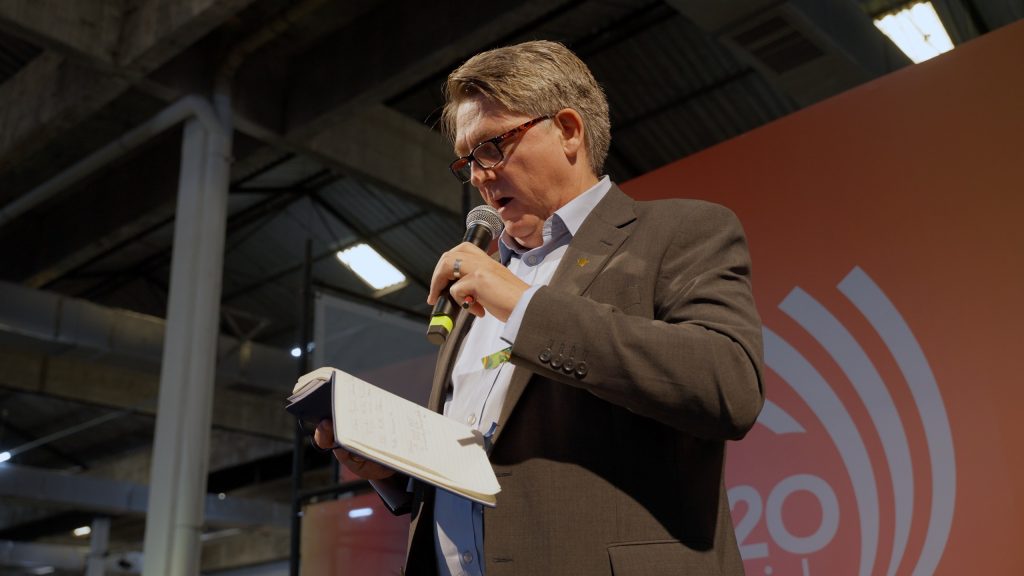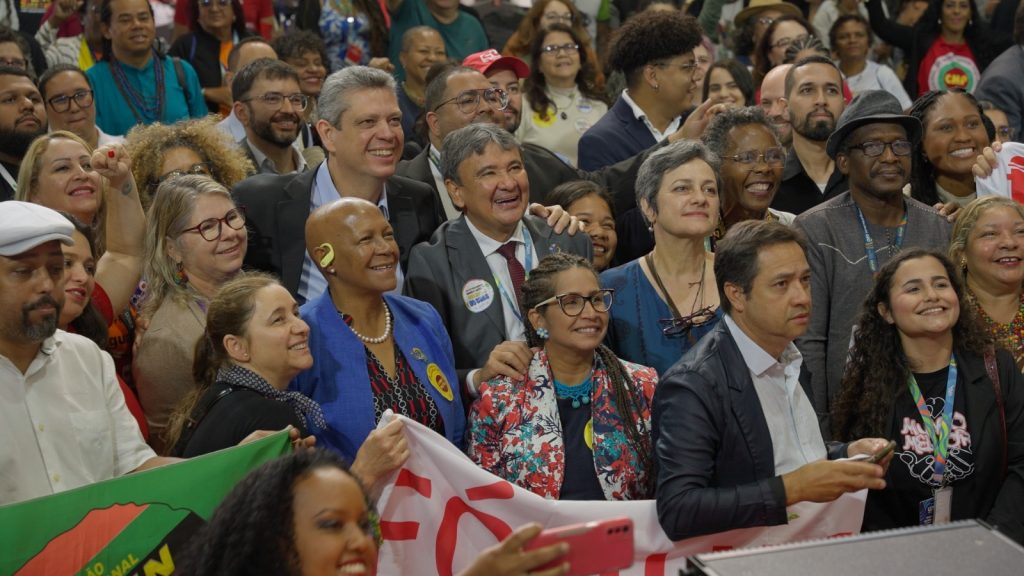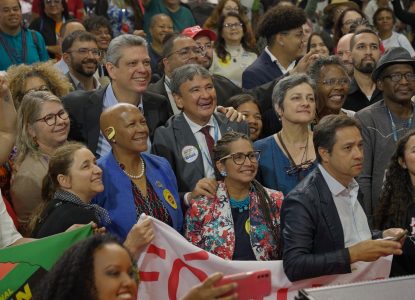By JoAnne Wadsworth, Communications Consultant, G20 Interfaith Forum
– – –
On November 14-16, 2024, the G20 Interfaith Forum joined over 200 civil society organizations at the inaugural G20 Social Summit in Rio de Janeiro. In a significant step forward for religious engagement in global policy discussions, the IF20 was invited to host a dedicated session focusing on faith perspectives on pressing global challenges. The forum structured its session around five key priority areas identified during its August meetings in Brasilia: food security, environmental protection, financial reform, social cohesion, and human trafficking. Each topic was introduced through video messages from religious leaders who had spoken at the Brasilia meetings, followed by in-depth presentations from policy experts and religious voices.
Food Security and Nutrition
Following a video message from the G20 Interfaith meetings in Brasilia, Asma Lateef, Chief of Policy and Advocacy Impact at the SDG2 Advocacy Hub, presented a sobering picture of global food inequalities. She emphasized how these inequalities are passed down through generations and are geographically determined.
“One in 4 children are in severe food poverty, with less than 10% of children receiving fruit and vegetables, and less than 5% getting adequate protein. These inequalities have huge impacts on physical development and brain capacity, affecting long-term health outcomes and learning potentials.”
Climate Action
Mary Robinson’s video message from the Brasilia meetings set the stage for environmental discussions, followed by Carlos Vicente, National Facilitator of the Interfaith Rainforest Initiative. Vicente highlighted how only 18 of the 194 Paris Agreement signatories are responsible for the majority of CO2 emissions, emphasizing the need to learn from indigenous communities about environmental stewardship.

Financial Reform
After a video message from Esben Lunde Larsen, Eric LeCompte, Executive Director of Jubilee USA Network, outlined three key policies for the upcoming Jubilee 2025 initiative: debt cancellation for countries in need, new innovative financing aid and grants, and increased resource mobilization.
“We’re dealing with the greatest financial crisis we’ve faced in our lifetimes. We’ve lost nearly two decades of development, and this turns into very real issues and challenges for working people and their families.”
Social Cohesion
Introduced by a video from Lilya Khasanova, speakers Irenilda Francisco and Ivo Pereira da Silva emphasized the fundamental importance of religious freedom in building cohesive societies. Francisco stressed that religious freedom must include both the right to have and not have religion, while da Silva presented society as a mosaic that is both diverse and interdependent.
Human Trafficking
Following a video message from Rabbi David Saperstein, Kevin Hyland OBE delivered perhaps the day’s most stark presentation.
“Currently, less than 1% of victims are formally identified, and less than 0.02% of victims see justice. The equivalent of 110 Boeing 737’s crashing every year is the amount of children who die from bad labor conditions yearly. I wonder what the world’s response to the former would be.”
Hyland called for both increased resources and better use of international instruments to combat trafficking.

Looking Forward
W. Cole Durham Jr., President of the G20 Interfaith Forum, concluded the session by emphasizing that while these challenges are daunting, they are “possible and imperative to solve.” He noted that we already possess the technical knowledge needed—what’s missing is the political will.
Several key themes emerged across the presentations:
- The need for integrated approaches to complex global challenges
- The vital role of religious communities in both policy formation and implementation
- The importance of protecting vulnerable populations
- The urgency of moving from knowledge to action
- The value of interfaith cooperation in addressing global issues
Making an Impact
The G20 Social Summit continued through November 16th, with the IF20 delegation invited to participate in international working groups developing recommendations for Brazilian President Luiz Inácio Lula da Silva. Working alongside other civil society organizations, the IF20 proposed four key additions to the recommendation document:
- The inclusion of Human Trafficking and Forced Labor on the G20 agenda
- The establishment of an official G20 working group on Human Trafficking
- The continuation of the G20 Social Summit in future years
- Special protections for rainforests with consideration for indigenous communities
Through the dedicated efforts of Rodrigo Vitorino Sousa Alves of CEDIRE, Kevin Hyland, and others, the recommendations on Human Trafficking and Forced Labor were successfully incorporated into the final G20 Social document. The text emphasizes the centrality of decent work and explicitly calls for combating slave labor, child labor, human trafficking, and all other forms of labor exploitation.
Most significantly, this advocacy carried through to influence the Final Declaration of the main G20 Summit itself. In Article 31 of the Leaders’ Declaration, approved by consensus of all G20 leaders on November 19th, the G20 explicitly commits to:
“protect workers’ rights… empowering workers and eradicating forced labor, ending modern slavery and human trafficking, as well as eliminating all forms of child labor.”
This progression – from IF20 advocacy at the Social Summit, to inclusion in the Social Summit’s recommendations to President Lula, to final incorporation in the G20 Leaders’ Declaration – represents a remarkable achievement in elevating this critical issue to the highest levels of global policy discussion and commitment. It demonstrates the growing influence of religious voices in global governance and validates the G20 Interfaith Forum’s sustained advocacy on issues of human dignity and social justice. The inaugural G20 Social Summit has proven to be not just a platform for dialogue, but a genuine mechanism for advancing meaningful policy change.

— —
JoAnne Wadsworth is a Communications Consultant for the G20 Interfaith Forum Association and Editor of the Viewpoints Blog.


